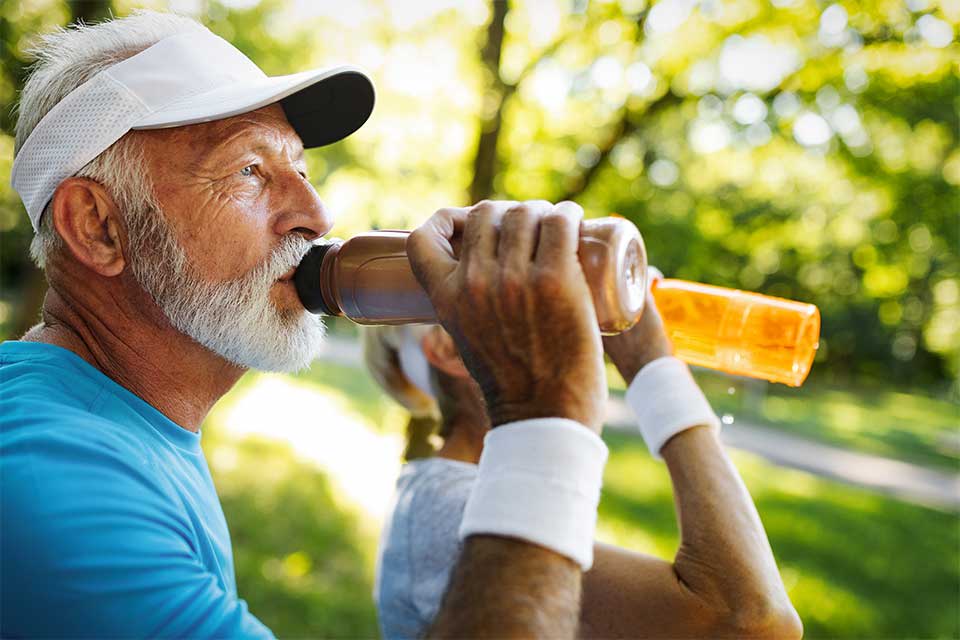
What are the Dangers of Heatstroke for the Elderly? Signs, Symptoms, and Tips for Prevention

There are several factors that make elderly people more susceptible to heat-related illnesses which may include underlying health conditions and certain medications. The body retains less water as people age, which may increase the chances of a senior becoming dehydrated if they fail to drink water or eat hydrating foods regularly. Understanding what to do to avoid heat-related illnesses and how to identify symptoms can help you keep your loved one safe when the temperature rises.
Let our care assessment guide you
Our free tool provides options, advice, and next steps based on your unique situation.
Key Takeaways
- Seniors may be more susceptible to heat-related illness due to several factors such as underlying health conditions, medications, and hydration challenges.
- Heatstroke is a serious heat-related illness with symptoms that may include dizziness, confusion, reddened skin, and an elevated heart rate.
- For a senior exhibiting signs of a heat-related illness, immediate care is necessary, like taking measures to cool them off and seeking emergency assistance.
- Take measures to help a senior loved one stay cool like encouraging them to stay hydrated and ensuring they are wearing proper clothing.
Why does the heat affect the elderly more?
The elderly are more vulnerable to heat for several reasons.
- The ability to sweat decreases with age. Older adults produce less sweat because their bodies retain less water, and less available sweat results in a reduced ability to cool through evaporation.
- Many seniors have underlying health conditions that make them less able to tolerate heat. Impaired cardiovascular function can make it difficult for the body to regulate its internal temperature because blood vessels are the body’s heat ducts. When the cardiovascular system is impaired, it can be difficult for the body to transmit heat to the surface for dissipation.
- Some medicines seniors take can contribute to dehydration. Many medications that treat heart disease, kidney conditions, and blood pressure have diuretic effects, meaning they trigger the body to expel water and salt through urination. Our bodies use salts as electrolytes and, without proper replenishment, the body remains dehydrated.
- Seniors may forget to hydrate. Being well hydrated is key to maintaining optimal bodily and cognitive function, and when dehydrated, cognitive decline and physical weakness may perpetuate the cycle of insufficient water consumption.
What is heatstroke?
Heatstroke is the most severe heat-related illness, according to the Centers for Disease Control and Prevention (CDC). It’s a medical emergency requiring fast treatment.
Heatstroke, sometimes referred to as sunstroke, occurs when the body can no longer manage its temperature. It’s defined as a rapidly increasing body temperature of more than 103 degrees Fahrenheit accompanied by neurological warning signs such as confusion, seizures, or loss of consciousness.
Symptoms of heatstroke in the elderly
- Change in behavior (e.g., confusion, combativeness, staggering, possible delirium)
- Body temperature of 103 degrees or more
- Red, hot, or dry skin with no sweat
- Rapid pulse
- Dizziness or confusion
- Loss of consciousness
What is heat exhaustion?
Heat exhaustion is milder than heatstroke, but it can progress to a heatstroke if left untreated. Heat exhaustion typically occurs after excessive sweating. It’s the body’s response to an extreme loss of salt and water.
Symptoms of heat exhaustion in the elderly
- Heavy sweating
- Pale, cold, and clammy skin
- Muscle cramps
- Fast, weakened pulse
- Fatigue
- Nausea or vomiting
- Headache
- Fainting
How to treat heatstroke in the elderly
Treating heatstroke in the elderly requires immediate medical attention. If you suspect your loved one is experiencing heatstroke, follow these steps:
- Seek emergency help. Call 911 or take them to a hospital. A delay in treatment can be fatal or cause irreparable damage.
- Cool them off. While you’re waiting for help to arrive, take them to a cool area. Remove unnecessary clothing and apply ice packs or cold compresses to their body. If possible, immerse them in cool water to lower their temperature more rapidly.
- Avoid giving them too much liquid or aspirin. The majority of heatstroke sufferers are in an altered state of consciousness, which can make it hard to drink or swallow safely. If they’re able to drink, help them drink a little at a time. Do your best to keep them cool and conscious until help arrives.
7 summer heat safety tips: advice for the elderly in hot weather
Preparation is key to maintaining a healthy balance of fun and sun. The following tips can help your loved one safe this summer by learning how to prevent heatstroke, heat exhaustion, and other heat-related illnesses.
1. Make sure your senior loved one drinks plenty of liquids to avoid dehydration
Dehydration in seniors is often the cause of many heat-related health issues and may cause symptoms such as dizziness, fatigue, and headaches. Severe or long-term dehydration can lead to hospitalization, and serious health conditions like bladder infections and kidney stones.
Examples of hydrating beverages include:
- Water
- 100% juice drinks, like pure orange juice or apple juice
- Sports drinks high in electrolytes
- Coconut water
Drinks that can lead to dehydration:
- Alcohol
- Caffeinated drinks

Let our care assessment guide you
Our free tool provides options, advice, and next steps based on your unique situation.
2. Make sure your loved one wears appropriate clothing for hot temperatures
Proper clothing and accessories, like sun umbrellas, can help prevent sunburns and heat exhaustion, and allow the body to cool more easily. Examples of warm weather clothing and accessories include the following:
- Light-colored clothes
- Lightweight fabrics or materials
- Loose-fitting clothes
- Hats or sunglasses
3. Encourage your loved one to stay indoors during midday hours
During periods of extreme heat, the best time to be outdoors is before 10 a.m. or after 6 p.m., when the temperature tends to be cooler. The following tips can help your loved one keep their indoor spaces cool during the hottest parts of the day:
- Close windows and blinds during the day
- Take cool baths or showers
- Sleep in the coolest room and use light linens
- Turn off artificial lighting and electronics
4. When checking weather reports, pay attention to the heat index and dew point
While many people regularly check the outside temperature in their area, it can be helpful to reference weather reports that note the heat index and dew point as well. Many weather apps and websites will list the temperature as well as the “feels like” number, which factors humidity and temperature to approximate how the weather really feels.
A high dew point means there’s more moisture in the air, according to the National Weather Service (NWS). The higher the dew point, the muggier it feels and the more you need to worry about your elderly loved one’s comfort. Note the following dew point ranges:
- Less than or equal to 55: comfortable or dry
- Between 55 and 65: muggy or sticky
- Greater than or equal to 65: very hot and damp
5. Encourage your loved one to slow down to avoid heat exposure
Remind your aging loved one that taking it easy in the summer can help their overall health and energy levels. When exposed to the sun, their body has to work overtime to keep cool. Heart and metabolic rates increase, too. This is why doing something as simple as sitting outside can leave them feeling fatigued.
When the humidity or dew point is high, it’s best to relax and avoid certain outdoor activities, such as exercise, gardening, lawn care, home repair, etc.

Talk with a Senior Living Advisor
Our advisors help 300,000 families each year find the right senior care for their loved ones.
6. Ensure your loved one is eating healthy, hydrating foods
In addition to increasing fluid intake, there are many fruits and vegetables that can help keep your loved one nourished and hydrated, too. Have them readily available to enjoy as a snack, or serve them as a side dish with meals.
Hydrating fruits:
- Watermelon
- Strawberries
- Grapefruit
- Pineapple
- Starfruit
Hydrating vegetables:
- Cucumbers
- Romaine lettuce
- Celery
- Radishes
- Zucchini
7. Check in regularly with elderly loved ones
Call or visit senior loved ones regularly during hot weather. Keep these considerations in mind:
- Check whether they’re drinking water and staying hydrated.
- Offer to pick up their favorite beverages or hydrating foods if they’re running low.
- Ask how much time they spend outside. Do they use sunscreen, hats, and sunglasses?
- Make sure they have air-conditioning or fans.
Lastly, if your loved one is struggling to pay utility or energy bills, the National Council on Aging has a list of energy assistance programs. The Low-Income Energy Assistance Program specifically helps seniors with energy and cooling costs.
Families also ask
How long does it take for an elderly person to recover from heat exhaustion?
Recovering from heat exhaustion usually takes 24 to 48 hours, according to Mount Sinai hospital. However, recovery can depend on how long it took for a person to be cooled. Recovery may also take longer for individuals with other medical conditions.
What is the fastest way to recover from heatstroke in elderly?
Recovering from a heatstroke requires that a senior receives immediate medical attention, according to the Cleveland Clinic. While waiting for care, apply ice to a senior’s neck, armpits, and groin. It’s also important for a senior to drink fluids such as water or sports drinks.
Centers for Disease Control. Tips for Preventing Heat-Related Illness.
https://www.cdc.gov/disasters/extremeheat/heattips.htmlCleveland Clinic. Drink Up: Dehydration is an Often Overlooked Health Risk for Seniors.
https://health.clevelandclinic.org/drink-up-dehydration-is-an-often-overlooked-health-risk-for-seniors/Climate Central. Seniors at Risk: Heat & Climate Change
https://ccimgs-2020.s3.amazonaws.com/2020HeatAndSeniors/2020HeatAndSeniors_Final0623.pdfCMAJ. Heat stress in older individuals and patients with chronic diseases. https://www.cmaj.ca/content/cmaj/182/10/1053.full.pdf
Frontiers in Molecular Biosciences. Dehydration and Cognition in Geriatrics: A Hydromolecular Hypothesis.
https://pubmed.ncbi.nlm.nih.gov/27252943/Journal of the American Medical Association. Heat Stroke.
https://jamanetwork.com/journals/jama/fullarticle/2667073National Institutes of Health. Heat-related health dangers for older adults soar during the summer.
https://www.nih.gov/news-events/news-releases/heat-related-health-dangers-older-adults-soar-during-summerNutrients. Neurocognitive Disorders and Dehydration in Older Patients: Clinical Experience Supports the Hydromolecular Hypothesis of Dementia.
https://www.ncbi.nlm.nih.gov/pmc/articles/PMC5986442/Rush. How the Body Regulates Heat.
https://www.rush.edu/news/how-body-regulates-heatWorld Health Organization. Information and Public Health Advice: Heat and Health.
https://www.who.int/globalchange/publications/HeatstressAnnouncement_250818.pdf
Senior living options in all states
The information contained on this page is for informational purposes only and is not intended to constitute medical, legal or financial advice or create a professional relationship between A Place for Mom and the reader. Always seek the advice of your health care provider, attorney or financial advisor with respect to any particular matter, and do not act or refrain from acting on the basis of anything you have read on this site. Links to third-party websites are only for the convenience of the reader; A Place for Mom does not endorse the contents of the third-party sites.
Make the best senior care decision
Make the best senior care decision